What do rabbits eat?
Rabbits, being strict herbivores, have a very specific dietary requirement that's crucial for their health and well-being. Their digestive system is delicately balanced, and providing the wrong food can lead to serious and sometimes life-threatening consequences. Understanding what constitutes a healthy rabbit diet is paramount for responsible ownership.
The foundation of a rabbit's diet is undoubtedly hay. This isn't just a filler; it's essential for maintaining their dental health and ensuring proper digestive function. Rabbits' teeth grow continuously throughout their lives, and chewing hay helps to wear them down naturally, preventing painful overgrowth. Furthermore, the fibre in hay promotes healthy digestion, preventing problems like stasis (a potentially fatal condition where the digestive system slows down or stops). Unlimited access to high-quality hay, such as Timothy hay (best for adult rabbits), meadow hay, or oat hay (in moderation), is absolutely non-negotiable.
While hay forms the bulk of their diet, pellets, fresh vegetables, and the occasional fruit treat can supplement it. However, it's crucial to maintain a proper balance to avoid nutritional imbalances and digestive upsets. Too many pellets can lead to obesity, while excessive fruits and vegetables can cause diarrhoea and other health problems.
| Food Type | Examples | Importance | Quantity Guidelines |
|---|---|---|---|
| Hay | Timothy, Meadow, Oat | Essential for dental health and digestive function | Unlimited access |
| Pellets | Commercial rabbit pellets (high-fibre, low-sugar) | Supplementary source of nutrients | Small amount daily, based on weight and activity level |
| Vegetables | Leafy greens (parsley, cilantro, romaine lettuce, spring greens), carrots (sparingly), bell peppers, broccoli (small amounts) | Provides vitamins and minerals | Small portions, varied selection daily, introduce new veggies gradually |
| Fruits | Banana (small pieces), apple (without seeds), berries (a few) | Occasional treats only | Very sparingly, due to high sugar content |
What are the best vegetables for rabbits to eat?
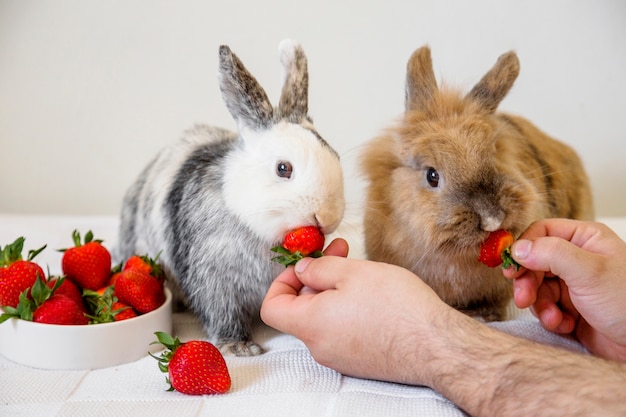
The ideal vegetable selection for your rabbit prioritizes leafy greens, which are packed with essential vitamins, minerals, and fibre. Dark leafy greens such as kale, collard greens, spinach (in moderation, due to its oxalic acid content), parsley, cilantro, basil, and watercress offer a wealth of nutrients. However, it's important to introduce new vegetables gradually to avoid digestive upset. Start with a small amount and observe your rabbit's reaction before increasing the portion size. Some rabbits are more sensitive than others.
Other vegetables, such as carrots, bell peppers, and broccoli, can be given as occasional treats. However, these should be offered in smaller quantities than leafy greens due to their higher sugar content. Always ensure vegetables are fresh, clean, and thoroughly washed before feeding.
It's crucial to avoid vegetables known to be toxic to rabbits, such as iceberg lettuce (low nutritional value and can cause diarrhoea), rhubarb, and potatoes.
| Vegetable | Benefits | Caution |
|---|---|---|
| Leafy Greens (Kale, Spinach, Parsley etc.) | High in vitamins, minerals, and fibre | Introduce gradually, monitor for digestive upset; Spinach should be given sparingly due to oxalic acid. |
| Carrots | Sweet treat, good source of beta-carotene | High sugar content, give sparingly |
| Broccoli | Nutrient-rich | Can cause gas in large quantities |
| Iceberg Lettuce | Low nutritional value | Can cause digestive upset; Avoid |
What fruits can rabbits safely eat, and which should they avoid?
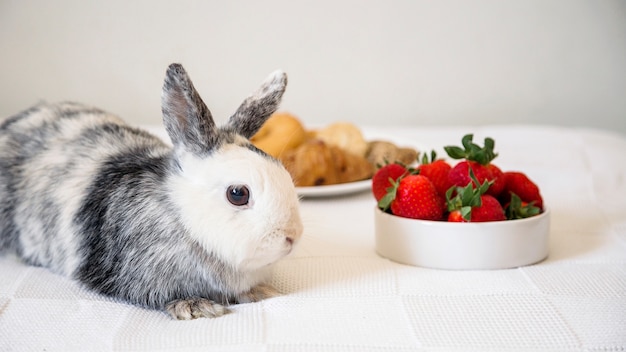
Fruits should be considered exceptional treats, given only very sparingly due to their high sugar content. The high sugar concentration in fruits can lead to dental problems, obesity, and digestive issues in rabbits. If you choose to offer fruit, do so in minuscule amounts. A tiny sliver of apple (ensure seeds are removed), a small piece of banana, or a couple of berries are acceptable occasional treats. But these should really be exceptions, not the rule.
Crucially, some fruits are toxic to rabbits and should be avoided entirely. This includes grapes, raisins, citrus fruits, and cherries. Even seemingly innocuous fruits can cause problems if given in excess. The overall principle is to keep fruit consumption to an absolute minimum.
| Fruit | Safe? | Notes |
|---|---|---|
| Apple (without seeds) | Yes, sparingly | Remove seeds before giving |
| Banana | Yes, sparingly | High in sugar |
| Strawberries | Yes, sparingly | High in sugar |
| Grapes/Raisins | No | Toxic |
| Citrus Fruits | No | Toxic |
| Cherries | No | Toxic |
How much hay should a rabbit eat daily? Is it the most important part of their diet?
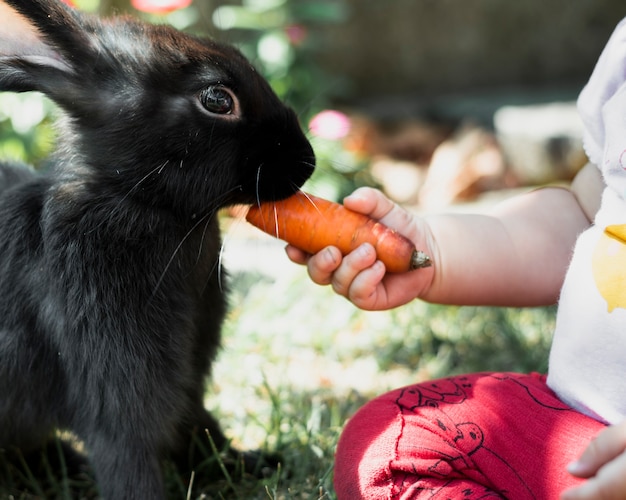
Absolutely! Hay is the most critical component of a rabbit's diet. It should constitute approximately 80-90% of their daily intake. Rabbits need unlimited access to high-quality hay at all times. This ensures continuous chewing, which is essential for wearing down their constantly growing teeth. Insufficient hay intake can lead to overgrown teeth, causing pain, difficulty eating, and potentially even requiring veterinary intervention. Furthermore, the high fibre content in hay promotes a healthy digestive system, preventing potentially life-threatening conditions such as gastrointestinal stasis.
The type of hay is also important. Timothy hay is generally considered ideal for adult rabbits due to its lower sugar and calorie content. Other types, such as meadow hay and oat hay, can be offered but often in smaller quantities or as part of a varied hay mix. Ensure the hay is fresh, green (or golden, depending on the type), and free from mould or dust.
| Hay Type | Suitability | Considerations |
|---|---|---|
| Timothy Hay | Excellent choice, particularly for adult rabbits | Low in calories and sugar, high in fibre |
| Meadow Hay | Good option, often a mix of grasses | Can vary in nutritional content depending on the specific mix |
| Oat Hay | Slightly higher in calories, suitable in moderation | Best suited for young, growing rabbits or those needing a higher-calorie diet |
What are the dangers of feeding rabbits commercial rabbit pellets?
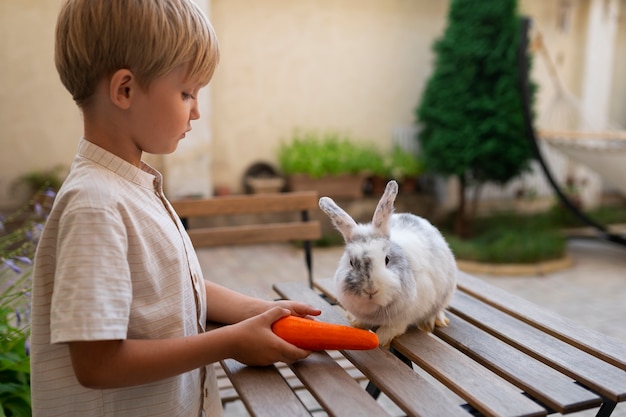
Commercial rabbit pellets can play a supplementary role in a rabbit's diet, but they should never replace hay as the primary food source. Many commercially available pellets are formulated with high levels of concentrates and sugars, leading to several health problems. Over-reliance on pellets can result in obesity, dental issues, and digestive problems.
The high sugar content in some pellets contributes to dental problems because they don't provide the necessary abrasive action for wearing down teeth like hay does. Obesity, in turn, increases the risk of various health complications. Moreover, poor-quality pellets may lack essential nutrients, leading to nutritional deficiencies. Choosing pellets carefully is crucial. Opt for pellets that are specifically formulated for rabbits, are high in fibre, and low in sugars and added ingredients. Check the ingredient list; fibre should be listed prominently, and added sugars should be minimal.
Always follow the recommended feeding guidelines on the pellet packaging, ensuring you don't overfeed. Remember, pellets should only supplement a diet dominated by high-quality hay and a selection of appropriate vegetables.
| Pellets Issue | Consequences | Mitigation |
|---|---|---|
| High Calories, Low Fibre | Obesity, digestive problems | Choose high-fibre, low-calorie pellets; limit quantity |
| Added Sugars | Dental problems, weight gain | Select pellets with minimal added sugar |
| Low Quality Ingredients | Nutritional deficiencies | Choose pellets from reputable brands with transparent ingredient lists |
Can rabbits eat grass? What types of grass are safe?
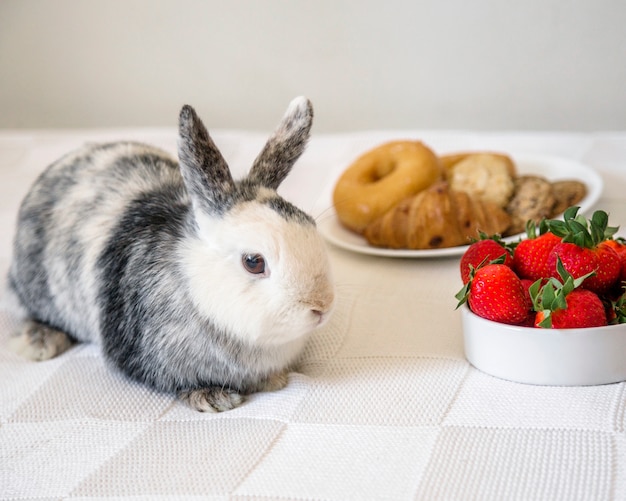
Rabbits can eat grass, but only under specific conditions. Grass can form a small part of a varied diet, providing additional fibre and nutrients. However, it's crucial to ensure the grass is safe and suitable for consumption. Never let your rabbit graze on lawns treated with pesticides, herbicides, or fertilisers, as these chemicals can be highly toxic. Even seemingly harmless lawn treatments can cause serious illness or death. Similarly, avoid grass that is wet, mouldy, or has been treated with weed killers.
The safest option is to provide your rabbit with grass from a field known to be free from chemicals or to grow your own grass specifically for your rabbit's consumption. Introduce grass gradually into their diet, starting with small amounts to monitor their digestive response. Avoid offering large quantities, as this can lead to digestive upset.
| Grass Type | Safety | Considerations |
|---|---|---|
| Organic, Untreated Grass | Generally safe, introduce gradually | Ensure it's clean, dry, and free from contaminants |
| Treated Lawns | Unsafe, avoid completely | Chemicals can be highly toxic to rabbits |
| Wet or Mouldy Grass | Unsafe, avoid completely | Can cause digestive problems and infections |
What are some common human foods that are toxic to rabbits?
Many foods commonly consumed by humans are toxic or harmful to rabbits. It's crucial to keep all potentially dangerous foods out of reach. Even small amounts of certain substances can have severe consequences. Some common culprits include chocolate (contains theobromine, which is toxic), avocado (contains persin, which can cause vomiting and diarrhoea), onions and garlic (contain compounds that damage red blood cells), caffeine (stimulant that can be fatal), and alcohol (highly toxic). Additionally, many other foods, while not immediately life-threatening, can still cause digestive upset.
Avoid feeding your rabbit any processed foods, sweets, salty snacks, or leftovers from your meals. Always stick to foods specifically known to be safe for rabbits to minimise the risk of accidental poisoning. If you suspect your rabbit has ingested a toxic substance, seek immediate veterinary attention.
| Toxic Food | Effect on Rabbit | Symptoms |
|---|---|---|
| Chocolate | Can be fatal | Vomiting, diarrhoea, tremors, seizures |
| Avocado | Digestive problems, potential toxicity | Vomiting, diarrhoea, lethargy |
| Onions/Garlic | Damages red blood cells | Weakness, pale gums, difficulty breathing |
| Caffeine/Alcohol | Can be fatal | Increased heart rate, tremors, seizures, respiratory distress |
How do I create a balanced diet for my indoor rabbit?
Creating a balanced diet for an indoor rabbit involves careful planning and consistency. The core principles remain the same as for outdoor rabbits: unlimited access to high-quality hay, a small quantity of rabbit pellets, and a variety of fresh vegetables. However, the specifics of portioning and types of food may need adjustments depending on your rabbit's age, weight, activity level, and individual needs.
Weigh your rabbit regularly to monitor their weight and ensure they're maintaining a healthy condition. Adjust food portions if necessary to prevent obesity or weight loss. A gradual introduction of new foods is always recommended. Start with a small amount and watch for any signs of digestive upset. Fresh, clean water should always be readily available.
Consult with a veterinarian or a rabbit-savvy professional for personalised dietary advice, particularly if you have any concerns or if your rabbit has specific health needs.
| Dietary Component | Percentage of Diet | Notes |
|---|---|---|
| Hay | 80-90% | Unlimited access, high-quality Timothy hay preferred for adults |
| Pellets | 5-10% | High-fibre, low-sugar; amount depends on weight and activity level |
| Vegetables | 5-10% | Variety of safe options; introduce gradually; monitor for digestive upset |
| Fruit | <1% | Occasional treats only; very small amounts due to high sugar content |
What are the signs of malnutrition in a rabbit?
Recognising the signs of malnutrition in a rabbit is crucial for timely intervention. Malnutrition can stem from insufficient food intake, an unbalanced diet, or underlying health problems. Several telltale signs should prompt immediate concern. Weight loss is a primary indicator. A rabbit that is progressively losing weight should be examined by a veterinarian. Other symptoms include a dull, dry coat, indicating a lack of essential fatty acids and nutrients. Lethargy, loss of appetite, weakness, and changes in faecal consistency (e.g., soft stools, diarrhoea) are additional warning signs.
Dental problems, such as overgrown teeth, can also result from a diet lacking sufficient fibre from hay, hindering their ability to chew properly. These symptoms often appear gradually, but their cumulative impact can severely compromise a rabbit's health. Early detection and intervention are key to preventing serious complications.
| Symptom | Possible Cause | Action |
|---|---|---|
| Weight Loss | Insufficient food intake, poor diet quality, underlying illness | Veterinary examination, dietary adjustment |
| Dull Coat | Nutritional deficiencies, underlying illness | Dietary review, veterinary examination |
| Lethargy | Weakness due to malnutrition, illness | Veterinary examination, supportive care |
| Dental Problems | Lack of hay, leading to overgrown teeth | Veterinary examination, dietary adjustments, dental care |
| Changes in Faeces | Dietary imbalance, illness | Veterinary examination, dietary adjustments |
What should I do if my rabbit refuses to eat?
A rabbit's refusal to eat is a serious sign requiring immediate attention. It's a critical indicator of potential health problems that can rapidly escalate. Do not delay seeking veterinary assistance; prompt action is essential. A rabbit's health can deteriorate quickly without adequate nutrition, so even a short period without eating can have significant consequences.
While waiting for veterinary care, you can try offering your rabbit small amounts of their favourite foods or a different type of hay to encourage consumption. However, don't force-feed your rabbit. Monitor their water intake closely; dehydration is another serious concern when a rabbit refuses food. Keep your rabbit warm and comfortable while awaiting veterinary assessment.
The underlying cause of food refusal could be anything from dental problems to gastrointestinal illness to stress. Only a veterinarian can accurately diagnose and treat the issue, so professional help is paramount.
| Action | Importance | Notes |
|---|---|---|
| Contact a Vet | Immediate action is crucial | Don't delay; rabbit's health can deteriorate rapidly |
| Offer Different Foods | Try different types of hay, fresh herbs, or small amounts of favourite foods | Do not force-feed |
| Monitor Water Intake | Dehydration can worsen the situation | Ensure fresh, clean water is always available |
| Keep Warm and Comfortable | Reduce stress and promote comfort | Provide a quiet, safe environment |
Everyone is watching

what do rabbits eat?
OTHER TYPES OF PETSRabbits, being strict herbivores, have a very specific dietary requirement that's crucial for their health and well-being. Their digestive system is ...
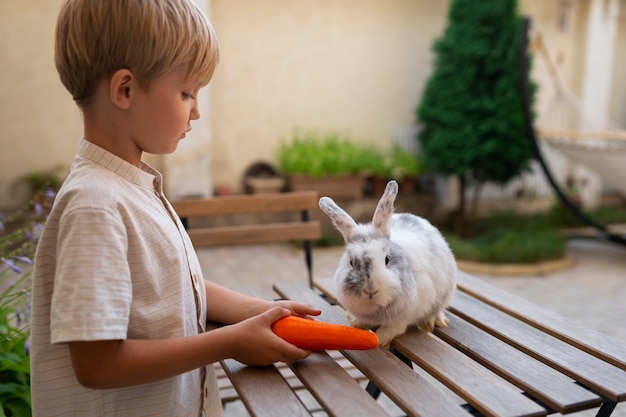
How Long Do Rabbits Live A Rabbit Lifespan Guide
OTHER TYPES OF PETSSo, you're curious about your fluffy friend's lifespan? It's a completely natural question! A rabbit's life expectancy is surprisingly variable, i...
Latest articles
-

what do rabbits eat?
OTHER TYPES OF PETSRabbits, being strict herbivores, have a very specific dietary requirement that's crucial for their health and well-being. Their digestive system is ...
-

How Long Do Rabbits Live A Rabbit Lifespan Guide
OTHER TYPES OF PETSSo, you're curious about your fluffy friend's lifespan? It's a completely natural question! A rabbit's life expectancy is surprisingly variable, i...
